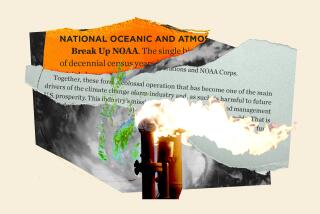White House report cites gaps in climate change strategy
Reporting from Washington — The federal government has “significant gaps” in its strategy to cope with the increasing effects of climate change on the country, according to a White House report scheduled to be released Tuesday.
The report will call for better risk assessments, more thorough scientific research and improved coordination of federal and local governments in order to handle the effects of warming temperatures, according to a draft of the report.
Adapting to warming temperatures, the report concludes, “will require a set of thoughtful, preventative actions, measures and investments to reduce the vulnerability of our natural and human systems to climate change impacts.”
The report urges federal agencies to fundamentally change how they plan for the future, by factoring the potential risks and opportunities of a changing climate into their decision-making. It also advises agencies to rely less on historical climate data when making plans for transportation, energy, infrastructure and natural resource use.
The task force that produced the report includes the White House Council on Environmental Quality, the Office of Science and Technology Policy and representatives from nearly every corner of the federal government.
The report comes at a time when global warming skeptics are increasingly criticizing the science of climate change, fueled by a string of controversies surrounding leading climate scientists.
President Obama has asked the task force to lay the groundwork, by this fall, for an explicit federal strategy to adapt to climate change.
The draft report is a first step in that process and is light on specific recommendations.
It concludes that climate change “is affecting, and will continue to affect, nearly every aspect of our society and the environment” through increasingly severe floods, droughts, wildfires and heat waves, along with rising sea levels.
Those impacts are already “affecting the ability of federal agencies to fulfill their missions,” the report said.
More to Read
Sign up for Essential California
The most important California stories and recommendations in your inbox every morning.
You may occasionally receive promotional content from the Los Angeles Times.










